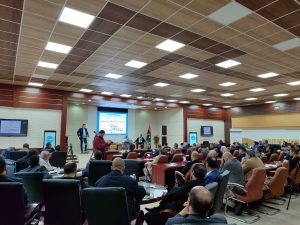Within the framework of the H2020 5TOI project we present today a second paper produced by the Nexus Think Tank, the network of Euro-Mediterranean experts elaborating position papers on strategic issues regarding Innovation in Water, Energy and Food in the region. the full version of these papers can be accessed through the project’s website and can be downloaded.
Today’s paper has been written by G. Perez (Universidad Autonoma de Barcelona) , A. Soraci (INNOVABIC) and M. Valiente (Universidad Autonoma de Barcelona) and it elaborates on avaliable Innovation Indicators in Mediterranean countries and Turkey. Nowadays, one of the most challenging topics of Europe is to support and to put forward, in particular in the Mediterranean area, the concept of Innovation. Issues relating to the transfer of knowledge acquired in the Mediterranean area, should also be targeted with specific support and the creation of favourable and stable conditions for innovation, ensuring the availability of the skills needed for the successful deployment of new technologies. However, how to evaluate the evolution of indicators in the Mediterranean through the last years with some indicators?
There are several available indicators to check countries’ innovation status. Among them, the Global Innovation Index (GII), together with the corresponding annual reviews, becomes a remarkable tool to check the innovation capacity of the countries. Such index has demonstrated that innovation capacity must be measured beyond what it does locally, in other words, to measure how nation’s innovations impact on the entire globe. Even more, when issues such as poverty, health, urbanization, access to water, and climate change are of a global nature, at the same time, both the challenges and their solutions have local consequences. Therefore, those innovative breakthroughs that provide local solutions in the developing world can have a global impact and can provide an opportunity for sharing among other emerging nations for mutual benefit. To this end, 5TOI_4EWAS projecti has checked the evolution of the innovation-related indicators that constitute the sub-pillars linked to elements of the national economy that enable innovative activities: (1) Institutions, (2) Human capital and research, (3) Infrastructure, (4) Market sophistication, and (5) Business sophistication or those sub-pillars that are the results of innovative activities within the economy (6) Knowledge and technology outputs and (7) Creative outputs. A total of 82 indicators for each country have been reviewed. The study covers some Mediterranean Partner Countries (MPCs) such as Morocco, Algeria, Tunisia, Egypt, Lebanon, Jordan and Turkey, during the period 2011-2016. Further detailed information for each indicator is available through deliverable D3.3. accessible at www.5toi.eu. The information derived from such indicators allowed to determine for each country the corresponding Global Innovation (GII), Innovation Input (IIS), Innovation Output (IOS) Index and the corresponding Innovation Efficiency Ratio (IE). The IE allows to check how much innovation output a given country is getting for its inputs.
To download the full article please click here.






